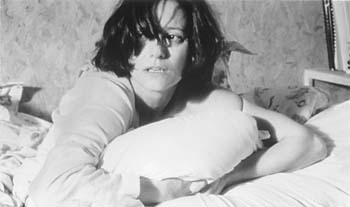Inside Diane Clovier
More than the cat's in heat in 'Post Coitum'
THE TITLE THEME from the French tragicomedy Post Coitum is the song of a cat in heat--wordless they may be, but cats are eloquent. The title is a reference to the old Latin saying that all animals are sad after sex--except for men and roosters.
We see the lonely heroine, Diane Clovier (Brigitte Roüan, who directed and co-wrote), writhing around over the titles, wretched and, like her pet cat, moaning in heat after her lover has left. The unhappy Clovier is so lovelorn that the veins stand out on her head. In flashback, Post Coitum shows us how she came to such a state.
With a nice husband and two nice children, she's a reasonably happy Parisian editor until she meets the gorgeous Emilio (Boris Terral), the housemate of a writer Diane is nursing through a creative crisis. Swiftly, Emilio picks up Diane, following her right into the bathroom of the restaurant where they've gone to lunch and taking her in the stalls as she feebly protests, "I must get home."
Coming home red-chinned from the rasping of Emilio's beard stubble, Clovier at first thinks she can cover up the liaison. Soon, however, she has abandoned all restraint. Emilio (who enjoys the sex, but that's about it) is in the position of Dr. Frankenstein after he realized that his creature was a little stronger than he had planned. As Emilio says, "Three or four fucks, and she thinks I'm her future!"
In every aspect except length, Post Coitum is a pleasure. Patrick Chesnais, as Philippe the cuckolded husband, gives a delightful performance as the embodiment of the grand old French cliché Monsieur Entendu ("Mr. Understanding"). Finding his wife naked and dead drunk on the doorway of their home, the civilized husband can only mutter, "This ought to be forbidden by the Geneva Convention."
A subplot has Philippe at his job as a lawyer, defending a woman who killed her unfaithful husband right at the breakfast table. By shifting the agony of infidelity to another character, Roüan keeps the story light and crisp.
Post Coitum isn't a critique of bourgeois life; if anything it offers a moral lesson about throwing yourself into the cauldron. Going as spectacularly to pieces as she does, Diane is her own victim. If she'd been more clear-eyed, she could have seen that Emilio is a born narcissist, even if he's so cute that women comment on him as he walks past.
Roüan's clever conceit is that Emilio works on humanitarian water projects in Africa; for coolness, this trumps Diane's job as a book editor and makes her feel even less adequate. (A favorite scene: Emilio draws a bath for the weeping Diane. Then, as she tries to soak up some consolation, he muses out loud that she's floating in eight times the amount of water that a pregnant African woman and her child would be allotted in a drought month. Offended, Diane snaps, "This isn't a suffering competition.")
Post Coitum goes on too long by at least 30 minutes, and feeling Diane's pain becomes less droll and more dull as the end approaches. But Roüan finishes the story with a reprieve. Post Coitum is very sexy and very wise, and when was the last time you saw a film about an extramarital affair in which neither retribution nor caution played a part?
[ San Jose | Metroactive Central | Archives ]
![]()

Pillow Talk: Lovelorn Diane (Brigitte Roüan) can't hide her feelings in 'Post Coitum.'
Post Coitum (Unrated; 97 min.), directed by Brigitte Roüan, written by Roüan, Santiago Amigorena, Jean-Louis Richard and Guy Zylberstein, photographed by Pierre Dupouey and starring Roüan, Boris Terral and Patrick Chesnais.
From the April 23-29, 1998 issue of Metro.
![[Metroactive Movies]](/movies/gifs/movies468.gif)